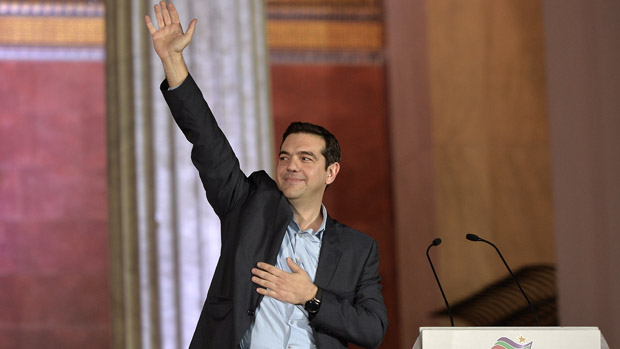Greek elections: will Syriza victory trigger a 'Grexit'?
Alexis Tsipras's Syriza party wins over voters with plans to reject austerity and cancel Greece's debt

A free daily email with the biggest news stories of the day – and the best features from TheWeek.com
You are now subscribed
Your newsletter sign-up was successful
Syriza supporters were singing and dancing in Athens last night as the far-left party celebrated a stunning general election victory. The party won 149 seats out of 300, just two short of an absolute majority, and is now seeking a coalition partner in order to form a new administration. Voters appeared to be won over by Syriza's pledge to reject austerity and cancel Greece's billions of pounds of debt. But as Prime Minister Antonis Samaras, of the governing centre-right New Democracy party, conceded defeat, there were ripples of uncertainty across the European Union and the international markets.
So what does the win mean for austerity-ravaged Greece and could it lead to the country pulling out of the eurozone?
What does Syriza stand for?
The Week
Escape your echo chamber. Get the facts behind the news, plus analysis from multiple perspectives.

Sign up for The Week's Free Newsletters
From our morning news briefing to a weekly Good News Newsletter, get the best of The Week delivered directly to your inbox.
From our morning news briefing to a weekly Good News Newsletter, get the best of The Week delivered directly to your inbox.
The party represents an alliance of diverse left-wing splinter groups promising to negotiate more favourable bailout terms and restore social security in Greece. The party is led by the charismatic Alexis Tsipras, who rose to prominence as a mayoral candidate in Athens in 2006. At the age of 40, he has become the youngest leader in the nation's modern history. Tsipras wants to cut Greece's debt, promising a wide range of policies intended to kick start a growth-led recovery. These include raising the minimum wage by almost 50 per cent and reinstating collective bargaining.
Why is Syriza so popular?
"After years of social ruin, Syriza is offering Greeks that precious thing: hope," writes Owen Jones in The Guardian. Greece has seen the severest economic austerity in Europe over the last few years. One in four people are out of work, pensions have been cut by nearly 40 per cent and poverty has surged from 23 per cent before the economic crash to over 40 per cent in 2014. Tsipras has vowed to end Greece's "five years of humiliation and pain".
The party has made huge gains in recent years, polling at just four per cent when it first emerged. It quickly became the country's main opposition group, going on to win the European elections last year.
A free daily email with the biggest news stories of the day – and the best features from TheWeek.com
One of the party's main priorities will be to tackle the grip of the "oligarchs" on the country's economy and wage war against tax avoidance. Such policies have been welcomed by ordinary citizens who have borne the brunt of the country's spending cuts and tax hikes.
How has Europe reacted?
The euro has fallen to $1.11 against the US dollar, the lowest level in more than 11 years. The BBC says the result will send "shockwaves" through Europe, while raising hopes for parties that are critical of the EU. "The potential for wider revolt across Europe is expected to spook the markets as investors respond to the heightened chance of Greece defaulting on its debts and crashing out of the single currency – a scenario dubbed Grexit," says The Times. The flight of capital out of Greek banks is also likely to accelerate and Greek government bonds will be considered more risky.
Jens Weidmann, president of Germany's Bundesbank, said he hoped the new government would "not make promises it cannot keep and the country cannot afford", while Belgian finance minister Johan Van Overtveld warned that Greece "must respect the rules of monetary union". David Cameron has tweeted that the Greek election "will increase economic uncertainty across Europe" and said this is why the UK must stick to its financial plan.
Will Greece stay in the euro?
Tsipras has previously said that the party wants to see Greece in the euro on the condition that "social cohesion is not threatened". He wants to renegotiate the terms of the country's €240 billion bailout, which he claims is stifling Greece's recovery. However, opinion within the party appears to be divided, with Panagiotis Lafazanis, a senior politician, telling German newspaper Spiegel that the party wants a definite exit and a "complete break" with the "totalitarian" EU.
In the Daily Telegraph, Peter Oborne warns that nothing will be solved by Syriza's "empty promises" that the euro can be reconciled with prosperity. "Public services have decayed, the economy has collapsed and all hope is lost," he says. Tsipras is liked by the Greeks, because he "reflects the reckless national mood", says Oborne, but it is "frightening to think what lies ahead".
Syriza: the radical Greek left-wingers poised to take power
07 January
The radical opposition party Syriza is set for victory in Greece later this month, sending ripples of uncertainty across the European Union and the international markets.
A snap general election is set to be held on 25 January, triggered by the Greek parliament's failure to elect a new president last year, and analysts are predicting that Syriza will win over voters with its pledge to renegotiate the terms of the country's bailout programme.
If the party is successful, it would be the first time a radical left-wing government has assumed power in the history of the EU, claims Owen Jones in The Guardian. So what would a win mean for austerity-ravaged Greece and could it lead to the country pulling out of the eurozone?
What does the party stand for?
Syriza, which only officially became a political party in 2012, represents an alliance of diverse left-wing splinter groups promising to negotiate more favourable bailout terms and restore social security in Greece.
The party is led by the charismatic Alexis Tsipras, who rose to prominence as a mayoral candidate in Athens in 2006. If his party wins, the 40-year old will become the youngest leader in the nation's modern history.
Tsipras wants to cut Greece's debt, promising a wide range of policies intended to kick start a growth-led recovery. These include raising the minimum wage by almost 50 per cent and reinstating collective bargaining.
Why is Syriza so popular?
"After years of social ruin, Syriza is offering Greeks that precious thing: hope," writes Owen Jones. Greece has seen the severest economic austerity an in Europe over the last few years. One in four people are out of work, pensions have been cut by nearly 40 per cent and poverty has surged from 23 per cent before the economic crash to over 40 per cent in 2014.
The party has made huge gains in recent years, polling at just four per cent when it first emerged. It quickly became the country's main opposition group, going on to win the European elections last year. "The journey of Syriza from a small protest party to government-in-waiting is a political fairytale," explains Costas Douzinas in The Guardian.
If it wins the general election, one of the party's main priorities will be to tackle the "oligarchs'" grip on the country's economy and wage war against tax avoidance. Such policies have been welcomed by ordinary citizens who have borne the brunt of the country's spending cuts and tax hikes.
What will happen if they win?
Costas Lapavitsas, an economics professor at London's School of Oriental and African Studies believes the party's promises are naive and that its pledges are not possible within the confines of the union.
But the key question European leaders and investors will be asking is: will Greece stay in the eurozone, or will it pull out if Syriza secures a majority?
"Our party as a whole wants to see the country in the euro," Tsipras says, but "on the condition that social cohesion isn't threatened."
However, opinion within the party appears to be divided, with Panagiotis Lafazanis, a senior politician telling German newspaper Spiegel that the party wants a definite exit and a "complete break with the totalitarian EU".
As a result, a win by Syriza could "usher in months of uncertainty in the eurozone and even revive fears of a Greek exit from the currency union", according to the Financial Times.
-
 Tourangelle-style pork with prunes recipe
Tourangelle-style pork with prunes recipeThe Week Recommends This traditional, rustic dish is a French classic
-
 The Epstein files: glimpses of a deeply disturbing world
The Epstein files: glimpses of a deeply disturbing worldIn the Spotlight Trove of released documents paint a picture of depravity and privilege in which men hold the cards, and women are powerless or peripheral
-
 Jeff Bezos: cutting the legs off The Washington Post
Jeff Bezos: cutting the legs off The Washington PostIn the Spotlight A stalwart of American journalism is a shadow of itself after swingeing cuts by its billionaire owner
-
 How corrupt is the UK?
How corrupt is the UK?The Explainer Decline in standards ‘risks becoming a defining feature of our political culture’ as Britain falls to lowest ever score on global index
-
 The high street: Britain’s next political battleground?
The high street: Britain’s next political battleground?In the Spotlight Mass closure of shops and influx of organised crime are fuelling voter anger, and offer an opening for Reform UK
-
 EU-Mercosur mega trade deal: 25 years in the making
EU-Mercosur mega trade deal: 25 years in the makingThe Explainer Despite opposition from France and Ireland among others, the ‘significant’ agreement with the South American bloc is set to finally go ahead
-
 Who is paying for Europe’s €90bn Ukraine loan?
Who is paying for Europe’s €90bn Ukraine loan?Today’s Big Question Kyiv secures crucial funding but the EU ‘blinked’ at the chance to strike a bold blow against Russia
-
 Moscow cheers Trump’s new ‘America First’ strategy
Moscow cheers Trump’s new ‘America First’ strategyspeed read The president’s national security strategy seeks ‘strategic stability’ with Russia
-
 Is a Reform-Tory pact becoming more likely?
Is a Reform-Tory pact becoming more likely?Today’s Big Question Nigel Farage’s party is ahead in the polls but still falls well short of a Commons majority, while Conservatives are still losing MPs to Reform
-
 Taking the low road: why the SNP is still standing strong
Taking the low road: why the SNP is still standing strongTalking Point Party is on track for a fifth consecutive victory in May’s Holyrood election, despite controversies and plummeting support
-
 Russian drone tests Romania as Trump spins
Russian drone tests Romania as Trump spinsSpeed Read Trump is ‘resisting congressional plans to impose newer and tougher penalties on Russia’s energy sector’